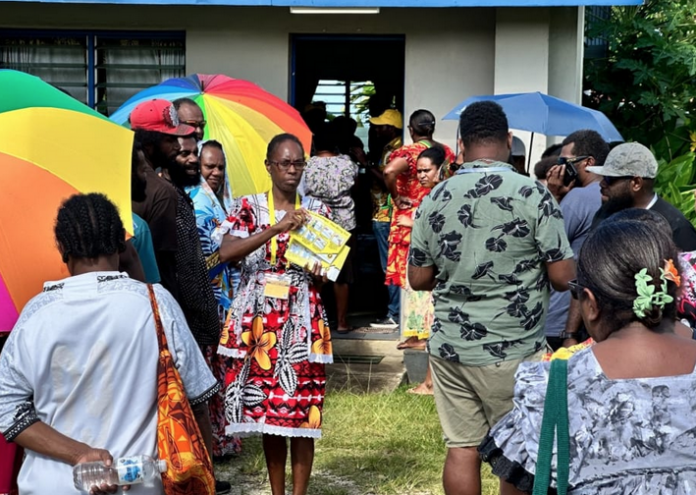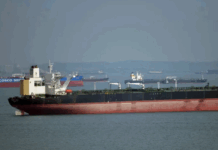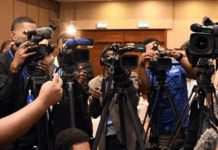
By Koroi Hawkins, RNZ Pacific editor in Port Vila
More than 180,000 registered voters are expected to cast their votes today with polls now open in Vanuatu.
It is remarkable the snap election is even able to happen with Friday marking one month since the 7.3 magnitude earthquake struck the capital Port Vila.
According to the government, 14 people died as a result of the quake, more than 210 were injured and thousands displaced.
- READ MORE: Vanuatu election: Preparation almost complete for snap ballot
- Other Vanuatu election reports
Despite all of this Principal Electoral Officer Guilain Malessas said they worked around the clock to deliver the election within the two-month timeframe stipulated by the constitution.
The voter turnout at the last election was less than 50 percent but Malessas is optimistic participation today will be high.
He urged voters to go and exercise their democratic right.
“This country — we own it, it’s ours. If we just sit and complain that, this, that and the other thing aren’t good but then don’t contribute to making decisions then we will never change,” Malessas said.
Not everybody convinced
But not everybody is convinced that proceeding with the election was the right decision.
The president of the Port Vila Council of Women, Jane Iatika, said many families were still grieving, traumatised and struggling to put food on the table.
“If they were thinking about the people they would have [postponed] the election and dealt with the disaster first,” she said.
“Like right now if a mother goes and lines up to vote in the election — when they come back home what are they going to eat?”
This is the second consecutive time Vanuatu’s Parliament has been dissolved in the face of political instability.
And the country has had four prime ministerial changes in as many years.
The chairman of the Seaside Tongoa community, Paul Fred Tariliu,. said people were starting to lose faith in leadership, not just in Parliament but at the community level as well.
Urging candidates to ‘be humble’
He said they had been urging their candidates to be humble and concede defeat if they found themselves short of the numbers needed to rule.
“Instead of just going [into Parliament] for a short time [then] finding out they don’t have the numbers and dissolving Parliament,” Tariliu said.
“We are wasting money.
“When we continue with this kind of attitude people lose their trust in us [community] leaders and our national leaders.”
The official results of the last election in 2022 show a low voter turnout of just over 44 percent with the lowest participation in the country, just 34 percent, registered here in the capital Port Vila.

Conducting the election itself is a complicated logistical exercise with 352 polling stations spread out over the 12,000-sq km archipelago manned by 1700 polling officials and an additional one in Nouméa for citizens residing in New Caledonia.
Proxy voting is also being facilitated for workers overseas.
360 police for security
Deputy Police Commissioner Operations Kalo Willie Ben said more than 360 police officers had been deployed to provide security for the election process.
He said there were no active security threats for the election, but he said they were prepared to deploy more resources to any part of the country should the need arise.
“My advice [to the public] is that we conduct ourselves peacefully and raise any issues through the election dispute process,” Kalo Willie Ben said.
The head of the government Recovery Unit, Peter Korisa, said according to their initial estimates it would cost just over US$230 million to fully rebuild the capital after the earthquake.
Korisa said they were getting backlash for the indefinite closure of the CBD but continued to work diligently to ensure that, whatever government comes to power this month, it would be presented with a clear recovery plan.
“We still have a bit of funding but there is a greater challenge because we need to have a government in place so that we can trigger the bigger funding,” Korisa said.
Polling stations close at 4:30pm local time.
Unofficial check count
Principal electoral officer Malessas said an unofficial count would be conducted at all polling station venues before ballot boxes were transported back to the capital Port Vila for the official tally.
According to parliamentary standing orders, the first sitting of the new Parliament must be called within 21 days of the official election results being declared.
A spokesperson for the caretaker government has confirmed to RNZ Pacific that constitutional amendments aimed at curbing political instability would apply after the snap election.
The most immediate impact of these amendments will be that all independent MPs, and MPs who are the only member of their party or custom movement, must affiliate themselves with a larger political party for the full term of Parliament.
They also lock MPs into political parties with any defection or removal from a party resulting in the MP concerned losing their seat in Parliament.
However, the amendments do not prohibit entire parties from crossing the floor to either side so long as they do it as a united group.
It remains to be seen how effective the amendments will be in curbing instability.
The only real certainty provided by the constitution after this snap election is that the option to dissolve Parliament will not be available for the next 12 months.
This article is republished under a community partnership agreement with RNZ.










































